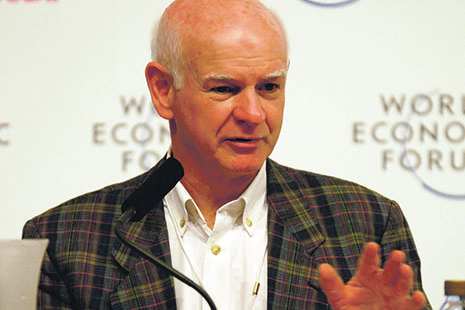IN 1932 the English socialist intellectuals Sidney and Beatrice Webb visited the Soviet Union. They returned to Britain with glad tidings. Soviet communism, they reported, represented “a new civilisation” destined to spread throughout the world. Quite apart from its massive economic and technical achievements, Soviet communism upheld a “code of conduct based on service to the community in social equality.” “The Worship of God,” they said, had been replaced by “the Service of Man.” The Webbs presented Stalinist Russia as a giant experiment in democracy providing for “the personal participation in public affairs of an unprecedented proportion of the entire adult population.”
Where historians have found starvation, tyranny and terror, the Webbs saw the working out of a new morality superior to that on offer in the West. Not even the Great Terror and the show trials of the 1930s caused them to hesitate. On the contrary, whereas the first edition of their study of the Soviet Union, Soviet Communism, had as its subtitle A New Civilisation?, by the time the second edition had appeared for the benefit of Left Book Club readers in 1937 the interrogative had disappeared.
Long before they became apologists for Stalinist Russia, the Webbs were among the founders of the London School of Economics and Political Science, or LSE. Although it’s the subject of Oxford-educated Sir Humphrey Appleby’s ridicule as Jim Hacker’s alma mater in Yes Minister, the LSE is one of the most distinguished academic institutions in Britain. It has a towering international reputation in the social sciences, and attracts the best academics and students from all over the world, many of whom pay very high fees for the privilege.
In recent months, the LSE has incurred what is these days politely called “reputational damage.” Its occasion has been the outbreak of a civil war in Libya, its cause the institution’s links with the Gaddafi dictatorship. The LSE’s problems in this connection are manifold. It had accepted £1.5 million over five years – of which £300,000 has been paid – from the Gaddafi Foundation for its Global Governance program. It signed a £2.2 million contract with the Libyan Economic Development Board for LSE staff to train Libyan officials in the ways of good government. The director of the LSE, Sir Howard Davies, also visited Libya to provide advice to Libya’s sovereign wealth fund, for which the university received a payment.
Some of the connections between the LSE and the Libyan regime are less direct but no less real for that. There is, for instance, Sir Peter Sutherland, a former chairman of BP. Sutherland was in the tent – literally – when Tony Blair kissed (happily for Blair, not literally) and made up with Gaddafi in Libya in 2004. Subsequently, Sutherland announced a £545 million oil deal with Libya – which from the West’s point of view was just the kind of outcome the rapprochement with the rogue state was intended to produce. Shortly afterwards, Sutherland became chairman of the LSE’s court of governors. Recently, he had the melancholy duty of accepting Davies’s resignation.
The link-man in all of these goings on was Saif al-Islam Gaddafi, one of the dictator’s sons. Saif arrived at the LSE in 2002 and later produced a doctoral thesis on global governance. Whether that dissertation was partly plagiarised, ghost-written, or both, is currently the subject of an investigation, as is the broader question of the LSE’s relations with the Libyan regime.
Saif had many of the characteristics that went down well among “progressive” intellectuals and New Labour types in Blair’s Britain. He had plausible manners and looked good in a suit. He gave the impression of Anglophilia. He flattered his hosts by speaking their “language,” banging on in impeccable English about “governance,” “civil society,” and “democratisation” as if the mere use of such buzzwords would obscure the reality that he was the pampered son of a brutal dictator running a Middle Eastern kleptocracy. Above all, he had lots of money; no rundown student digs for Saif. Lord Mandelson was apparently part of his circle. Saif clearly did not want for friends in his London heyday but it’s hard these days to find anyone willing to admit to an intimate acquaintance with him.
Hard, but not impossible. One old associate, Benjamin Barber, a senior fellow at the Demos think tank in the United States and a former member of the Gaddafi Foundation board, complained in the Guardian last week that the demonising of Saif had “made it extremely difficult to pursue a diplomatic track in Libya.” Saif, he claims, “is a man divided, torn between years of work on behalf of genuine reform that at times put him at risk, and the pull of clan and familial loyalties that drew him back into the bosom of a family defined by political tyranny and the rule of an autocratic leader and father.”
What is lacking in this amateur psychology – which echoes so many acts of rationalisation by those who have spent recent years treating with this vile regime – is any recognition that Saif might have a material interest in the survival of the family business. Saif is rich and powerful because his father has run Libya since the late 1960s. If his father ceases to run Libya, he may well remain rich – presuming he can get his hands on the loot the Gaddafi family will have salted away for just such a rainy day – but he won’t be powerful. Yet apparently, when Saif is not waving firearms about, or threatening “rivers of blood” – a nod to Enoch Powell, perhaps – or vowing with Churchillian resolution to “fight until the last man, until the last woman, until the last bullet,” he is quietly pursuing the same reform agenda to which he has so selflessly devoted himself over the last decade. Or so Barber seems to believe.
Barber is one of those who accepted money from a US-based consultancy firm, the Monitor Group, to visit Libya. Monitor appears to have played an especially unpleasant role, although one yet to be untangled. In his thesis, Saif thanks Monitor for helping him with research, and the company admits having assisted him. Monitor also accepted a US$3 million contract from the Libyan government to spin the Libyan dictatorship as all sweetness and light; the image-conscious group now admits that it shouldn’t have done so, although it presumably won’t be returning the money.
Much of that money, in any case, will have been passed on to others in exchange for their services. As part of its efforts to help Libya improve its international standing, Monitor agreed to arrange for the very best academics to visit Libya and help ensure that poor Colonel Gaddafi would no longer be so misunderstood among ordinary folk who might in their ignorance be inclined to associate him with the blowing up of aeroplanes and the killing of innocent civilians. But that’s so 1988; Monitor would help them get with the program.
Just what these academics received for their troubles remains undisclosed, but rather like Saif’s apparent eschewal of budget student accommodation, they wouldn’t have stayed in backpacker hostels. Nor would they have worked for free. Interestingly, Sir Howard Davies was named in the Guardian as a senior adviser to Monitor, as was Sir Mark Allen. Allen, a former diplomat, is credited – if that’s the word for it – with a central role in the 2004 rapprochement with Libya, as well as with negotiating the release from a Scottish prison of the only man to be tried for the Lockerbie bombing – a great propaganda coup for the Libyan regime. He later worked as a special adviser to BP and, predictably, as a member of one of the LSE’s advisory boards.
One of Monitor’s performing academics was Anthony Giddens, the renowned sociologist, “Third Way” theorist and former director of the LSE. Giddens visited Libya on two occasions and wrote in the New Statesman in 2006 of his three-hour meeting with Muammar Gaddafi (“You usually get about half an hour when meeting a political leader”). Giddens seemed fairly impressed by the old warrior, noting Gaddafi’s liking for Third Way thinking. Gaddafi apparently made “many intelligent and perceptive points” and Giddens gained “the strong sense” that Gaddafi’s “conversion” was “authentic,” even if also motivated by a desire to escape sanctions. In what would become a familiar refrain among Libya’s British friends, Giddens didn’t neglect to note that then LSE student, Saif, was “a driving force behind the rehabilitation and potential modernisation of Libya.”
The love affair of certain LSE academics with the Gaddafi family would become manifest in various episodes in the years ahead. There was the invitation to Saif to deliver the 2010 Ralph Miliband lecture, named in honour of the socialist academic and father of current Labour Party leader, Ed. There was also the excruciating occasion when Saif’s dear old dad, having been beamed in live from Libya to the LSE to give a lecture, was addressed as “Brother Leader” by the young academic asked to introduce him. This was a particularly bad look as the academic concerned, Alia Brahimi, happened to be a research fellow in a program funded by Libyan money.
Many a university vice-chancellor, when contemplating Davies’s and the LSE’s fates, has probably been prompted to reflect that “there but for the grace of God go I.” Indeed, the International Centre for Prison Studies at my own university, King’s College London, received £700,000 from the British Foreign and Commonwealth Office over six years to help the Libyans improve the running of their prisons. The college principal, Rick Trainor, defended this program in terms of the college’s mission of “service to society,” just as Davies defended the value of the LSE’s program to train Libyan civil servants.
No doubt all this is true, even if it conveniently overlooks both the vast sums of money involved and the propaganda value – to Libya – of the contacts with these academics. The LSE’s claims that the Libyan money didn’t affect its academics’ research agenda is both untestable and implausible. How, for instance, does one assess the research project never even conceived, or the awkward questions never posed by those who find themselves the beneficiaries of official largesse? Questions, for instance, such as who actually wrote Saif al-Islam Gaddafi’s PhD thesis.
Meanwhile, those who claim that Davies and the LSE are scapegoats for a university sector increasingly forced to seek money from unorthodox sources (such as arms dealers and Middle Eastern dictators) portray as reluctant supplicants those who delighted in their ability to combine political insider status – both in Tripoli and Whitehall – with entrepreneurial success. Not everyone came to the party. The LSE’s acceptance of Libyan money had its internal critics, such as the late Fred Halliday, the best-known scholar of the Middle East in the institution. But his warnings were brushed aside. And there are LSE students and staff who resent the damage the whole affair has caused to their school’s reputation.
But there were also careers to be advanced, and institutional ambitions to be fulfilled. Those who bring in large amounts of money are treated within universities as princes, in Britain no less than in Australia. The beer might be small when set beside the world of business and government, but money and power matter in universities as elsewhere.
Similarly, the brutality of the Gaddafi regime might seem less important when compared with the activities of the monster for whom the Webbs provided an apologia in their Soviet Communism. Nonetheless, the embarrassment suffered by Libya’s British academic barrackers might cause them to tread a little more warily in their future dealings with dictators and donors.
In the meantime, references to Libya become ever more scarce on LSE staff members’ online personal profiles. As George Orwell might have put it in 1984, “Britain is at war with Libya. Britain has always been at war with Libya.” •




